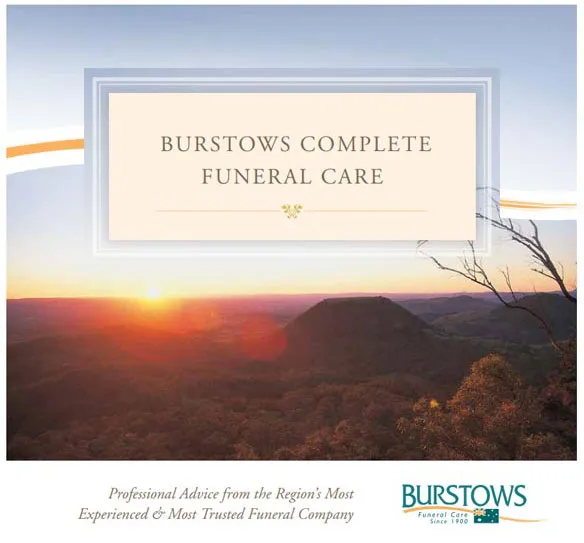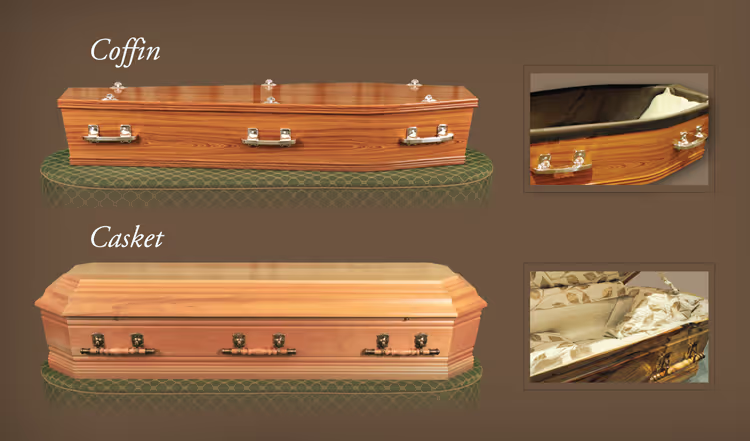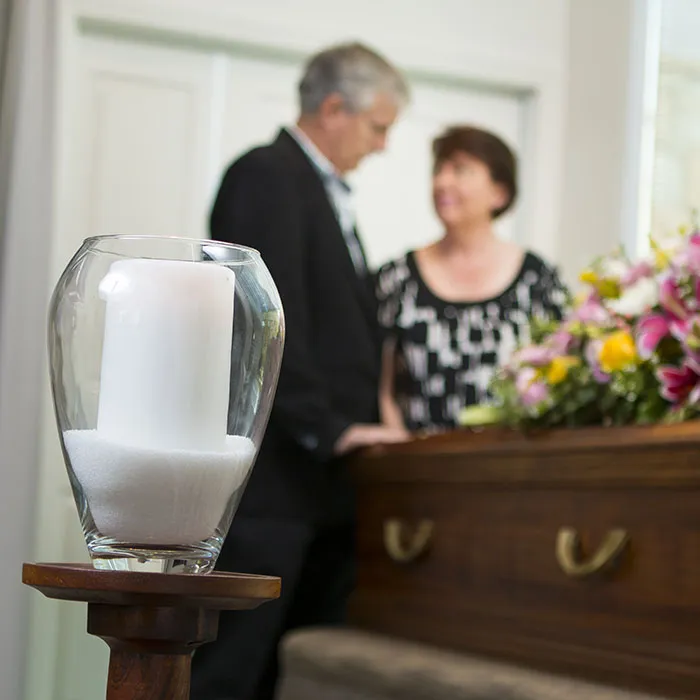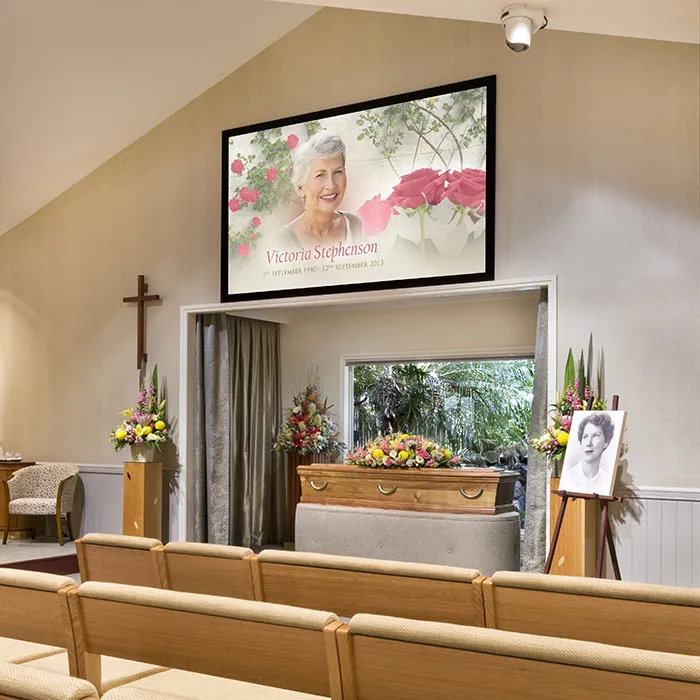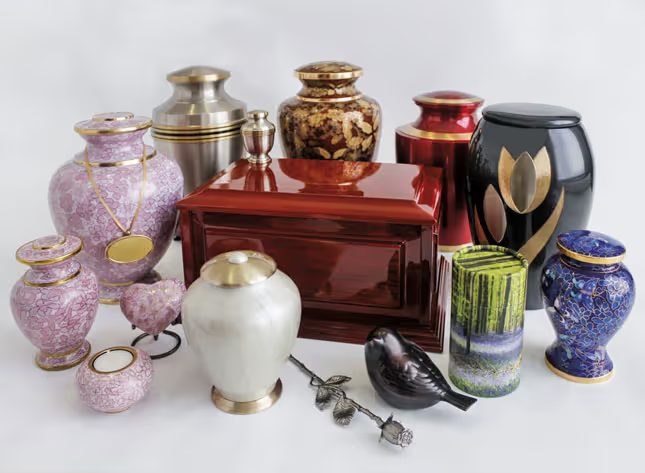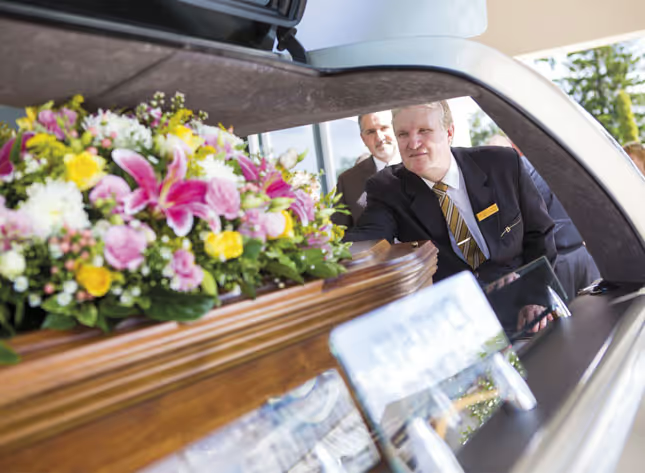The viewing is a time for family to support one another in their grief. The body is present in an open coffin or casket, allowing you and others who loved the person who has died to acknowledge the reality of the death and to say goodbye.
The decision to view is an individual one. Mourners should not be prevented from viewing, nor should they be forced to do so.
You may consider giving close friends the opportunity to be involved in the viewing.
If possible, try not to leave the viewing till the day of the funeral. Allow enough days between the death and the day of the service to benefit from the viewing.
The choice of clothing is yours. Choose clothing that reflects the tastes and personality of the person who died. Where clothing is not supplied, the funeral director will provide an appropriate shroud.
The order of service can be very simple or more involved.
Feel free to include any of the following:
- a photo image
- songs or hymns to be sung
- anecdotes
- a meaningful poem or passage or scripture
- a message to those attending
- the outline of the ceremony
- the eulogy
Your funeral director can arrange prompt preparation of the service sheet. However, allow yourself time to gather the information and then proof read the draft before it is printed.
There are two ways to approach writing the funeral notice. Both approaches are equally correct. Just consider what is right for you and the person who has died.
1. You can provide the 'who, what, where and when', that is, only the necessary facts.
2. You can provide an historical statement, a notice that many will cut out from the paper and keep. In addition to the who, what, where and when, this type of notice generally includes dates of birth and death and all immediate family names and may be worded in a way that reflects something of the essence of the person and the relationship others had with them.
Remember that newspapers will only accept a funeral notice from your funeral director.
Notice Example
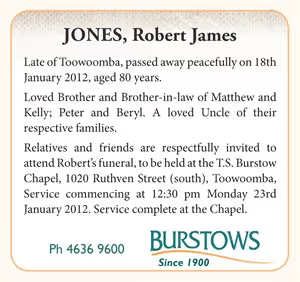
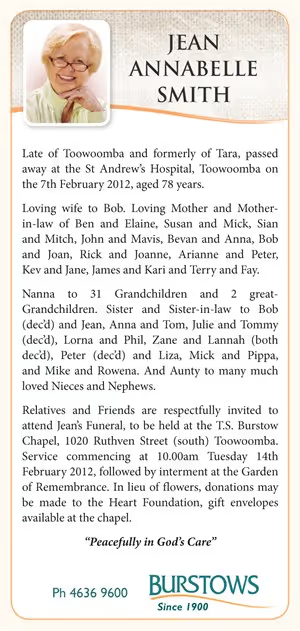
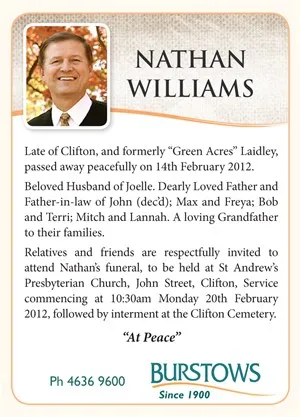
Your funeral director is responsible for ensuring the smooth running of the funeral service.
An important aspect of this responsibility is arranging payments on your behalf for the purchase of all goods and services associated with the funeral. These services might typically include cemetery plots, cremation fees, floral tributes, funeral notices, catering services, clergy and musician fees.

By arranging for all expenses to be itemised on one account, billing is kept as convenient as possible. Our own services will be detailed on the same invoice.
Payment can be made by cash, cheque or credit card. If the person who has died held a bank account with sufficient funds to cover funeral expenses, the funeral director's account can be presented to the bank for direct payment.
Although during a time of sadness it may seem awkward to talk about costs, open and honest discussion is necessary during the planning stages of the funeral. It is important to balance emotional decisions with practical common sense. When your funeral director addresses the issue of funeral expenses during the planning stage of the funeral, they are acting in your best interests.

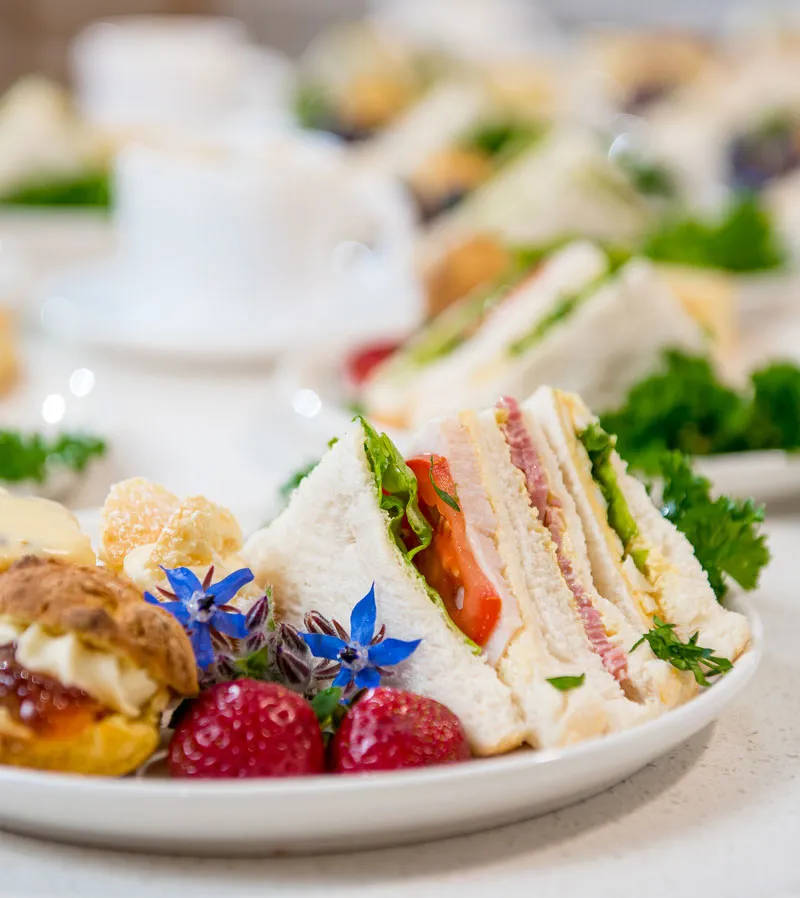
The smell, the presentation, the sharing of food and drink, bring us together, nourish our spirits, warm us from the inside, and help us to feel a little more whole.
After all the raw emotions of a funeral, gathering in a more relaxed atmosphere with others who have loved and lost that person has a uniting and healing effect that Sandy Lee has seen repeatedly over 25 years as catering manager at Burstows Funerals.
Grief expert Dr Alan Wolfelt describes the reception as "an informal time of release after the more formal elements of the funeral ceremony. The gathering is also a transition, a rite of passage back to living again. It demonstrates the continuity of life, even in the face of death".
For Sandy, the reception is a time of bonding; a place where memories come alive. It's a place to tell stories, talk about the deceased, their interests, their passions, perhaps their foibles, share your pain, to catch up with each other, and simply start to feel that life will go on.
It's a place for hugs, for laughter, for introductions and old friends.
"So often people today only really gather at weddings and funerals, so it is a special time for family, for classmates, old friends and neighbours to catch up," Sandy said.
"When families are going through so much, Burstows' Pioneers Room is a lovely, peaceful place. With the gardens outside, the Pavilion, and even the children's playground, it has a wonderful warmth and homeliness. There's the smell of coffee or tea, of freshly baked cakes and scones ... it's not exotic but it's food made with love and it's very comforting, I think."
When receptions couldn't be held during Covid, or gathering restrictions were in place, Sandy said "the hardest thing was no hugging or contact ... a lot of people just need that touch at a time when you have lost someone so dear to you".
Like the funeral, the reception is different for everyone, depending on the deceased's character and the circumstances. Perhaps the death could be foreseen due to age when, despite their sadness, people can rationalise that the deceased "had a good life" and "lived well", or it may be an unexpected tragedy. Regardless, those closest to the deceased need support - to know they are not alone.
In a campaign against loneliness, cooking guru Julie Goodwin said it perfectly, "Food connects us, it nourishes us, and the sharing experience creates wonderful memories and strong communities".
While there is often some tentativeness on first arrival at the reception, as people wonder what is expected, Sandy said the welcome they receive quickly puts them at ease, and the room is soon full of chatter.
Those organising funerals have told Sandy said that knowing the Pioneers room was there, rather than having to make more decisions when your mind has so many things to think about, eased their stress. And for those attending, it is a relief to just take those few steps from the Burstows Chapel to the reception... no need for farewells, nowhere else to drive, nothing to co-ordinate.
At times, families have special requests to include in the reception a favourite food, colour, hobby, sports theme or music of the deceased, and the Burstows team "do everything we can to help make that happen".
For herself, Sandy says being involved in what many would see as a difficult field, is very rewarding. "I can truly say that, although there have been challenges at times, I've really enjoyed my years here, the team I work with, and being able to help people through this process of grieving and put them on that road to healing ... it's very special."
For inquiries regarding the reception or any aspect of funeral planning, please contact Burstows Funerals on (07) 4636 9600.
Hints for writing and delivering the eulogy
At this time, when they are so important, the eulogy brings memories to the surface to be re-lived. In preserving and sharing these memories, you create a gift for others and yourself. Embrace this task you've been given. It means the world to those who share your grief.
Preparing to write
Before you begin to write, here is a simple strategy that will help you prepare. Know that you are not alone in your task; you have the support of family and friends.
1. Begin with the person's history
Note the significant events of the person's life in chronological order: childhood, education, jobs, marriage, children, places lived and so on.
2. Gather your stories
Jot down the stories that you remember-the ones that capture your loved one's character. Ask family and friends for their stories as well. These questions may help get you started:
- How did you first meet and become close?
- What did you love and admire about the person?
- What did they do that made you smile?
- What will you miss most?
Even the simplest stories are worthwhile. Remembering someone's laugh or their love of sweets, for example, can be as moving as recalling their kindness and generosity. Be sure to include stories that at least some of your listeners will remember.
3. Look at photos
Going through photo albums may remind you of important qualities and memories of the person who died.
4. Find a theme
By now you may see certain themes emerging. For example, your collection of stories may reveal the person's deep love of animals, the strays she brought home as a child, her dreams of becoming a vet and the joy she experienced at opening her own practice. Writing your eulogy to a theme will help it flow and is ideal for illustrating the character of your loved one.
5. Arrange your notes
Now you have a chronology, stories and a theme, you can put your notes in point form. We suggest arranging your material on cards, with a different story or idea on each card. Once you have placed the cards in order, you can begin to write your speech.
Writing the eulogy
In writing the eulogy, it helps to break it down into three parts: introduction, body and conclusion. With your opening words, introduce your listeners to the ideas you intend to elaborate on. For example, 'Today, we unite to honour and remember our loved one, who touched us all with her kindness and generosity'. The body of the eulogy is where you share the stories that demonstrate the qualities named in your introduction. Be sure to keep your theme in mind as you write and use linking sentences between each story so the eulogy flows. Use the conclusion to summarise the ideas raised in your speech and to reiterate what your loved one has meant to you.
Hints for writing
- Write as though you are talking to a friend, for that is what you will be doing-talking to a loving, supportive group.
- Compose your speech on a computer if possible so that you can edit along the way.
- Don't be afraid to use humour where appropriate. Remember, the eulogy is a celebration of the life of your loved one.
- You may want to use a special quote to open or close your speech. Look to poetry, songs and historical speeches for inspiration.
- Once you have completed your first draft, ask a trusted friend or family member to read it over and suggest any changes.
- When you are happy with your speech, type or write it out in large print with space between the lines so it is easy to read.
Delivering the eulogy
Public speaking can be frightening. You need to be brave. Know that your listeners are supportive and loving. Know that it's okay to make mistakes. No one expects you to be a great speaker and certainly not at this difficult time. It is your words, and the sentiment behind them, that matter the most.
Hints for speaking
- Before the day, practise in front of a mirror, imagining your listeners before you.
- If you fear that you might break down, arrange for a backup speaker to be on hand with a copy of your speech. Simply knowing they are there may get you through.
- When the time comes, be yourself. Imagine you are talking to a good friend.
- Speak clearly and project your voice so everyone can hear you.
- If you feel yourself becoming choked up with emotion, pause and take a deep breath to collect your thoughts. Your listeners will understand.
The wishes of the deceased are followed, if they are known. A cremation cannot take place if there are written instructions to the contrary.
Cremation is sometimes chosen as a lower-cost option, especially in metropolitan areas, where cemetery fees are very high. In regional areas, cemetery fees tend to be less expensive, so cost is not usually the main reason families choose cremation.
Cremation is a respectful, dignified process that feels right for many of today's families. If you would like to know more about this process, your funeral director will explain it for you.
Please also note that our service fee includes GST of 10%


